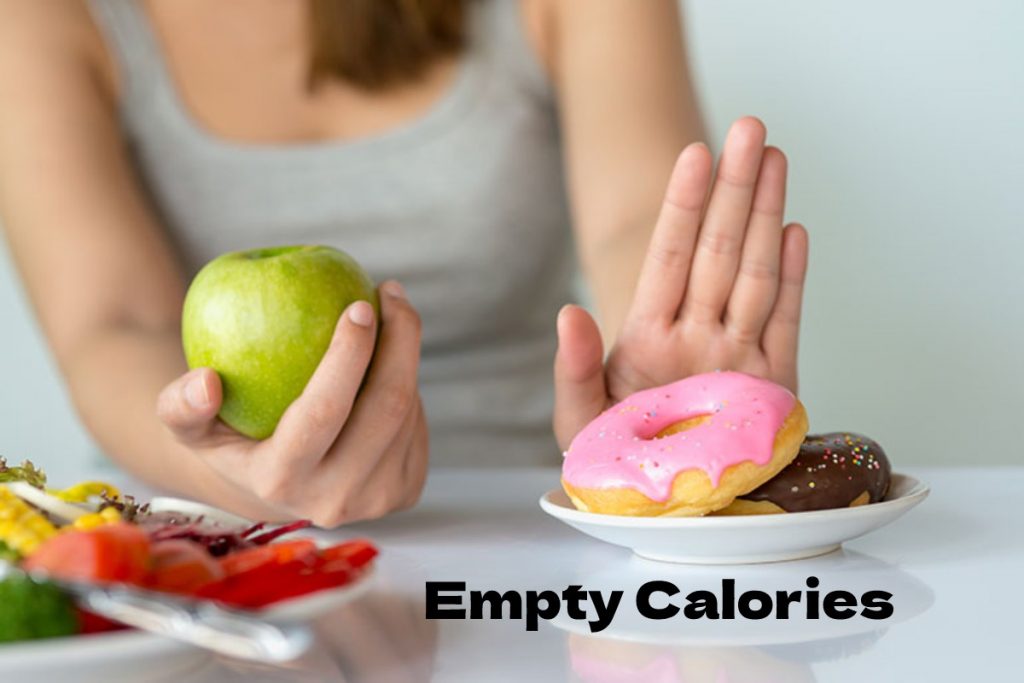Table of Contents
Definition
Empty calories are commonly used to describe calories found in foods and beverages that are poor in nutritional value. Still, in return, they can provide the body with a lot of energy because of their calorie richness.
It is particularly true for foods and beverages that may only be eaten for fun, like sweets and soft drinks.
this type of calorie is usually found mainly in the following food sources:
Added sugars.
Saturated fat.
Trans fats.
Alcohol.
Examples of Empty Calories
Here’s a list of the most prominent foods and beverages that are a source of empty calories:
Sweets and sugars rich in carbohydrates and sugars, such as:
Biscuit.
Cakes.
Granola panels.
Chocolate.
Solid sugar.
Treated oils, such as soy oil, canola oil.
Fast food, such as hamburgers and pizzas.
Some types of sauces, such as ketchup and barbecue sauce.
Some kinds of meat, such as:
Pork.
The sausage.
Sausages.
Sugar-rich beverages, such as:
Fruit juice.
Soft drinks.
Energy drinks.
How Many Empty Calories are Allowed?
To avoid any health damage or complications caused by empty calories, the amount of food you eat daily should not exceed the following proportions and figures:
One hundred twenty calories per day for children aged 2-8 years.
120-250 calories per day for children aged 9-13.
120-250 calories per day for adolescent girls aged 14-18 and for adult women.
160-330 calories per day for adolescent boys aged 14-18 and for adult men.
However, it should be noted that the ratios mentioned were based on the assumption that a person had eaten enough calories and various nutrients from other healthy sources and that empty-calorie were just extra calories.
Damage to Empty Calories
Empty calories can have many health damages and complications, as they can increase the chances of developing these health problems:
Obesity, Diabetes and gaining excess weight.
Malnutrition, a person here gets prices that do not have any nutritional benefit, which may make him vulnerable to the shortage of some essential nutrients, such as:
Vitamins.
Proteins.
Minerals.
Dietary fiber.
Essential fatty acids.
How can You Avoid Empty Calories?
To prevent or reduce empty calories, be sure to follow the following instructions and tips:
Focus on healthy Alternatives
Make healthy and intelligent dietary decisions by making minor adjustments to your diet, as follows:
Avoid fried food and replace it with grilled food.
Avoid full-fat products and replace them with low-fat or low-fat products if this option is available, such as:
Low-fat milk.
Low-fat cheese.
Low-fat labneh.
Eat cucumber and carrot slices instead of french fries.
Avoid sweetened breakfast cereals and replace them with unsweetened breakfast chips.
Avoid sugar, and replace it with fresh fruit.
Eat cucumber and carrot slices instead of french fries.
Avoid treated oils and replace them with healthy fats, such as olive oil.
Avoid high-fat meat, and replace it with low-fat meats such as turkey and skin-free chicken meat.
Avoid incomplete cereal bread and replace it with whole-grain bread.
Watch Out for the Liquids in Which your thirst is Quenched
When choosing and drinking liquids, abide by the following essential rules that may help you avoid empty calories:
Avoid drinking harmful and high liquids with empty calories, such as soft drinks, processed juices, and flavored water.
Drink enough water daily.
Eat Delicious Food
Eat enough vegetables a day, especially before dinner, as vegetables are low in calories and rich in fiber, so eating them can help you reduce hunger, curb appetite and reduce the likelihood of eating large amounts of foods that contain empty calories.
Make sure you get enough minerals and vitamins within your daily diet:
Dietary fiber: these are some of their natural sources: legumes, fruits, whole grains.
Calcium: some of its natural sources: milk and its products, green leafy vegetables, legumes.
Magnesium: these are some of its natural sources: nuts, seafood, whole grains.
Vitamin d: Some of its natural sources are egg yolks, liver, and some fish species.
Other Tips
To avoid empty calories as much as possible and to get good calories, stick to these essential additional tips:
Avoid using ready-made sauces and dressings while preparing food and sandwiches, such as mayonnaise.
Make sure you have breakfast every day.
Beware of meals that some may think are healthy when they contain empty calories, such as frozen yogurt, protein plates.


